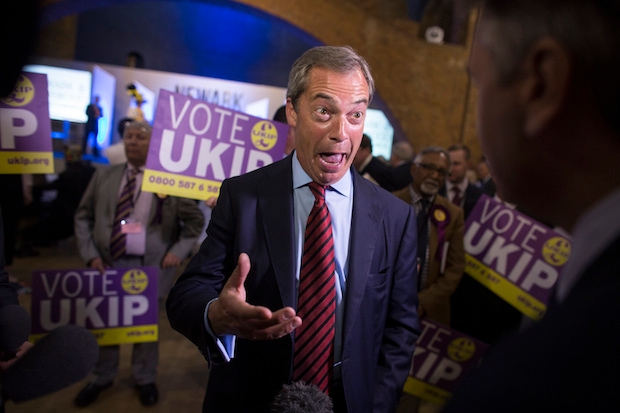So, the Tories have managed to hold onto Newark with a surprising 7,000 majority. For Ukip, it was a disappointing evening as they failed to come close to taking the seat. Despite adding 22 points to their 2010 vote share, the march of the People’s Army has encountered some unexpectedly difficult terrain. There were some interesting signs about the state of the parties and some hints as to what we might see in the general election next year. Here are six things that we’ve learnt from Newark:
1. Ukip are far from a Westminster breakthrough
Despite picking a local candidate in Roger Helmer and putting in a significant amount of effort (for them), Ukip’s dreams of returning their first MP have not come to fruition. Some will blame choosing a candidate with outspoken views, others would argue that Newark was never winnable for Ukip in the first place. But either way, the momentum gained by Ukip at the European elections is not looking so strong this morning.
[datawrapper chart=”http://static.spectator.co.uk/sZZig/index.html”]
2. The Lib Dems have serious problems on the ground
If it was a disappointing evening for Ukip, it was a disastrous one for the Liberal Democrats. Just four years ago, they took 20 per cent of the vote in Newark and rivalled Labour for third place:
[datawrapper chart=”http://static.spectator.co.uk/P8D6Z/index.html”]
Yesterday, they managed to win just 2 per cent of the vote – coming sixth behind the independent hospital campaigner Paul Baggaley and the Greens. The Lib Dems may argue they had no hope of winning the seat and didn’t waste resources. But, as James has pointed out, it’s the ninth time since 2010 they’ve lost their deposit. A worrying trend given that the general election is less than a year away.
3. The Conservatives can fend off Ukip
It took thousands of activists and frequent visits from senior cabinet ministers but the Tories have proven they can successfully fight off the Ukip threat. They even surprised Nigel Farage, who predicted a 2,500 Tory majority earlier in the evening. Considering the by-election was caused by a Tory sleaze scandal, a 7,000 majority is a good result. But there is no way the party can put this amount of effort into every single seat in next year’s elections. As Isabel explains, Grant Shapps and co need to figure out how to make #RoadTrip2015 work with fewer resources. If Ukip are more organized and effective by then, their vote spoiling effect may still be a problem for Tories.
4. Unlike the Lib Dems, Labour still has a core vote
It wasn’t a particularly great night for Labour either — their candidate Michael Payne came third and managed to take off 5 per cent from their 2010 vote share. Ed Miliband will be facing questions about how much effort was put into the election, having only visited the constituency once. But as I outlined last week, the make up of the seat provides Labour with a solid core vote. On that basis, 18 per cent for not doing much isn’t entirely bad.
5. Nigel Farage isn’t a serious campaigning leader
Where was the Ukip leader throughout this campaign? Instead of frequently popping into Newark— like David Cameron, who visited four times — Farage went off to a conference in Malta, where he was unfortunately caught by paparazzi from the Daily Mirror. He did deign to visit for 30 minutes yesterday though. It’s surprising that the party’s greatest asset, as admitted by Roger Helmer, didn’t put more effort in. Did Farage suspect they had no chance of winning the seat?
6. Tactical voting against Ukip has arrived
As the Telegraph’s Ben Brogan reports this morning, Newark has produced the first signs of tactical voting against Ukip. It appears that some Labour and Lib Dem voters ticked the Tory box yesterday just to keep Helmer out of office. The Lib Dem commentator Miranda Green said last night she’d happily have voted Conservative in Newark for this very reason. Could this be a silver lining to the Ukip assault on the Tories; picking up voters who are anti the anti-politics party?






Comments